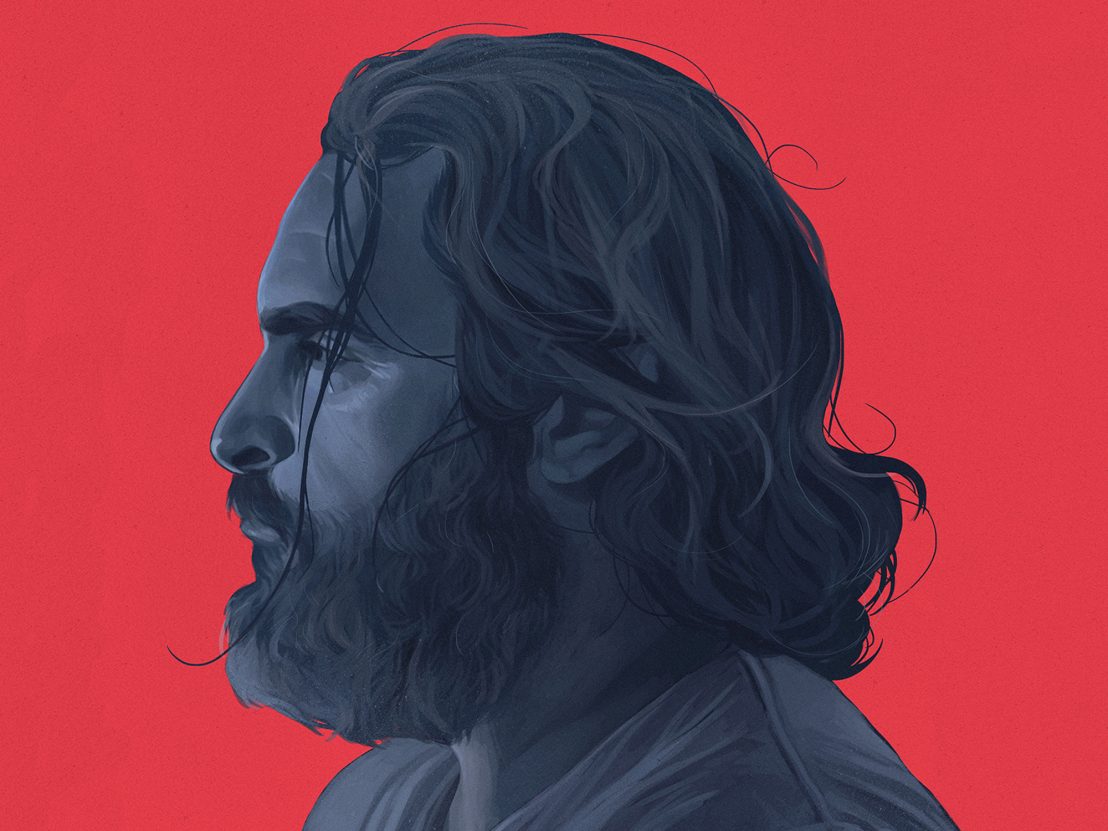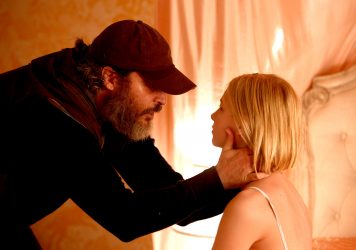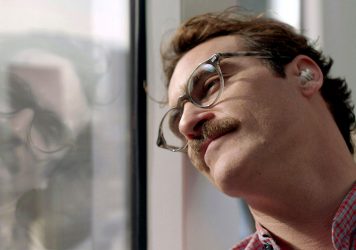
It’s hammer time for the famously intense leading man ahead of his starring role in You Were Never Really Here.
It’s a headfuck trying to reconcile Joaquin Phoenix with his character in You Were Never Really Here. The former is at pains to joke and pierce the idea that acting is a serious job. The latter, Joe, is just piercingly in pain. Like a bleeding warhorse with arrows protruding from his side, he lumbers on rescuing underage girls from New York brothels, killing those in his way with a whack from his weapon of choice: a hammer.
Phoenix was the only actor Ramsay wanted. She moved the production forward to fit his schedule. In return, she got a performance of trauma that seeps out of the frame and into the audience’s bones. Phoenix is so sought after partially because he loads quiet reactions into extremely physicalised characters. Joe is muscular but running to flab. He is powerful but slowed down by violent memories that won’t quit. Phoenix occupies this physique with searing pathos, and (to his surprise) he won the Best Actor prize at the Cannes Film Festival in 2017.
LWLies: This is a very brutal part. Does it take you time to get into it or is it something you can switch on?
Phoenix: I started working out two months before we started shooting. When you’re preparing for something, it’s all you think about. Like, right now I’m getting ready to do The Sisters Brothers [by Jacques Audiard]. I was just taking a walk along the water, and found myself saying lines out loud. But sometimes you show up and then you’re eating a fucking sandwich and bullshitting with the director, then you go and do the scene and at some point, if you’re lucky and if you’ve done the work, it’s easy to kind of slip into. Sometimes it’s not! Sometimes you get there and you do a couple of takes and you go, ‘Fuck, I couldn’t care less about this. I’m not feeling this.’ So I’d talk with Lynne, go through the story, skim through the script again, and think about, ‘Okay, what’s led to this moment?’ and hopefully you find it. But it’s not always there.
What drew you to Lynne Ramsay?
I was talking to Darius Khondji, a cinematographer who I’ve worked with a couple of times, trying to find what to do next. I said, ‘Who are the good directors that you like?’ He said ‘Lynne Ramsay’. Then, a couple of weeks later by chance, Jim Wilson, who’s the producer, who I’ve known for 20 years, he called me and said, ‘I’m doing this thing with Lynne, do you want to meet and talk to her about it?’
Do you know why you gravitate towards projects that are all-consuming?
I guess because it’s enjoyable, right, to work hard. I don’t even know if I work hard. This is bullshit. Maybe I don’t even like that. I don’t know what I like. I just say shit, man! I just say things. At its best every once in a while – and sometimes it’s one take for the entire movie and sometimes it never happens – there’s a fucking feeling that you get. I imagine you can get it in anything you do. If you play sports, or maybe if you’re writing something and trying to figure something out, and a sentence comes together fucking perfectly and you go, ‘Where did that come from? It just happened!’
It’s such an exciting feeling. You feel it all through your body. It’s so joyful. I’m always hunting for that feeling. I love that moment. It’s worth all the days when you search and nothing happens and you feel like, ‘I’m just fucking… this is terrible…’ You have that one moment where, I don’t know what it is, you’re just in your flow and that usually happens, when you work hard at something and you’re really dedicated to it. The times where I go, ‘Ah this is an easy scene, no big deal’ are always really dissatisfying and I regret it. So, I always look to work with people that are pushing themselves, and pushing me, because it’s more enjoyable, and you have a chance to touch that thing, whatever the fuck that is.
Do you prefer playing outsider characters to more social roles?
I liked this role, because it was mostly just me on set, and I need the director’s full attention constantly. If you have to share it too much with a bunch of other actors, I find that difficult. Her was probably the best experience I had as an actor. That was perfect for me. I told Spike [Jonze], ‘It’ll never get better than this’. I like a lot of the time to walk around set and figure things out. I’m selfish.
How do you do when you don’t have enough attention?
What are you trying to get at?
I’m just interested.
I think that I’m fine. Please, you know I’m fucking joking, you know that 90 per cent of what I say I’m trying to have a laugh.
I think you’re being sincere when you say you like the director’s full attention.
No that is true, I do. I do. I like the option of it. I don’t like a hovering director, I like to feel like when I’m in the space I’m not performing for somebody’s approval, right. That would be wrong. But I like the option of having them there, mostly just because I like to talk about things a lot.
You kind of flirted with the Marvel Cinematic Universe for a while. Is that something that you regret not doing?
I think they make some great, fun movies. There’s nothing wrong… I’m not a fucking, like, cinephile. I’m not a snob and I’m totally fine with… I enjoy those movies sometimes, and I think they keep the fucking industry going in some ways, so I don’t have a problem with it at all. I think that everybody was, is… I’m trying to figure out how to say this most diplomatically, okay… I think everybody was really happy with how things turned out. All parties were satisfied.
You Were Never Really Here is released 9 March. Read our review.
Published 7 Mar 2018

Joaquin Phoenix and director Lynne Ramsay combine forces to deliver a sensational cinematic sucker punch.

Whimsical futuro-romance effortlessly evolves into ambiguous, unfathomable hard sci-fi in Spike Jonze’s best film to date.